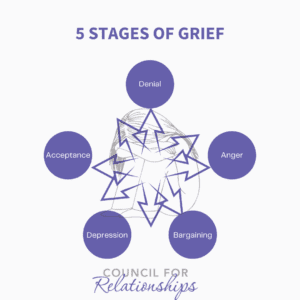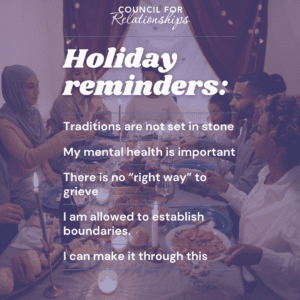Grieving During the Holidays: A Therapist’s Reflections
Grieving during the holidays, or for that matter, at any time of the year, is challenging to your mental health. When you feel pressured to act like you are not grieving around family and “friends,” it can harm your emotional well-being. Grieving, after all, is a nonlinear process…and it takes no breaks for family parties with unsavory people. Meghan Rydzewski, a CFR Staff Therapist, understands people’s challenges when grieving during the holidays.
Reflections from a Therapist on Grieving During the Holidays
The holidays are the happiest time of the year, right? For some people, yes, the holidays bring joy and comfort. Seeing loved ones for the holidays can be something to look forward to.
For others, the holidays can bring a feeling of sadness or dread. Holidays can be hard without the ones we lost, reminding us of their absence and making it tough. Or, the holidays might include seeing people you may not want to be around but feel like you “have to” attend anyway.
During the COVID-19 pandemic, families were isolated from their friends and family. Speaking for myself, I was frustrated at the time and the holidays I couldn’t spend with my grandmother. Years later, she has passed on, and the holidays feel different.
Thinking back and reflecting on the time that was lost can be frustrating and saddening. Making new traditions that can bring different joy to your life this holiday season can be important for your mental health.
Grieving during the holidays is especially hard. Missing a loved one any day is hard, but especially during holidays that you used to spend with each other.
What are the stages of grief?
The stages of grief used to cope with loss were first introduced by psychiatrist Elisabeth Kübler-Ross. These stages are not necessarily experienced linearly or predictably, and individuals may move through them at their own pace. The stages are:
- Denial: The initial reaction to loss is often denial. It’s a way of coping with the shock and overwhelming nature of the situation. Individuals may find it difficult to accept the reality of the loss.
- Anger: As the denial stage fades, anger may surface. This anger can be directed towards oneself, others, or even the situation or higher powers. It’s a normal part of the grieving process and can be a way to express pain and frustration.
- Bargaining: In this stage, individuals may attempt to make deals or bargains to reverse or alleviate the loss. They might make promises or seek ways to regain control. It’s a way of trying to find meaning and avoid the pain of the loss.
- Depression: As the reality of the loss sets in, feelings of deep sadness and despair may emerge. This stage involves coming to terms with the magnitude of the situation and the changes it brings. It’s a natural response to the profound impact of the loss.
- Acceptance: The final stage involves accepting the reality of the loss and finding a way to move forward. It does not mean all emotions are resolved, but there is acceptance and adjustment to a new reality without what was lost.
Not everyone experiences all these stages, and the process can differ for each person. Grieving is a unique and individual experience; people may revisit certain stages or move through them differently.
Grieving During the Holidays: Tips & Insights
It might feel nice to honor the loved one by making their favorite dessert or leaving their chair still at the table. Doing things that bring you comfort regarding your missed loved one can make or break your holiday without them. You must also create space to let yourself feel and grieve them.
Cutoffs during the holiday season can also be difficult. We all have family members we don’t talk to. Being around them can remind us of when we used to speak with them and bring up emotions and memories. It could bring up feelings of sadness or anger.
Do your best to care for yourself when surrounded by people you might not speak with anymore.
Prioritizing yourself this holiday season is important. Take time to focus on life’s little joys. Such joys may be enjoying beautiful lights, drinking your favorite beverage, baking family recipes, or starting new traditions.
Creating boundaries is essential to healthy grieving during the holidays
Many people do holiday activities because they feel they have to or because it’s a tradition. This is a common theme I notice as a therapist. This can feel isolating in itself.
Doing things we want to do during the holiday season could bring more joy to a person going through the motions. Deciding between desires and obligations affects how you feel during the holidays.
This sounds like boundaries to me. Setting boundaries can improve your comfort and happiness. It involves creating space between yourself and people or situations that make you uncomfortable.
Setting boundaries takes time and practice. They might upset others but are meant to make you feel safe and comfortable. The most important thing about boundaries is that they are for you, not for anyone else.
Creating a boundary of not talking politically together can protect your relationship with that person. If they do not agree to that boundary, that is on them, and you should do whatever you need to make yourself comfortable in that moment. You might excuse yourself from the room, get fresh air outside, or just splash water on your face.
I suggest being with people you want to be with this holiday and setting limits to feel more comfortable. As I have mentioned several times, grieving during the holidays is difficult. Putting yourself first may feel uncomfortable for some, but overall, it can be important for your mental health. Happy Holidays!
About the Author
Meghan Rydzewski, MFT, is a Therapist at the Council for Relationships who sees clients in New Jersey and Pennsylvania. Go to her bio page to ask about this blog on grieving during the holidays or Meghan’s availability for new clients.
See our Therapist & Psychiatrist Directory to find a different CFR therapist or psychiatrist near you.
More from CFR
Explore more great insights from our expert therapists, psychologists, and psychiatrists. Check out the CFR Expert Voices blog for great mental health advice and insight, and never miss a new CFR Expert Voices blog by signing up for our Expert Voices mailing list. Here are a few recent blogs we think you will enjoy.
Disenfranchised Grief: How the Passing of My Cat Made Me a Better Therapist



